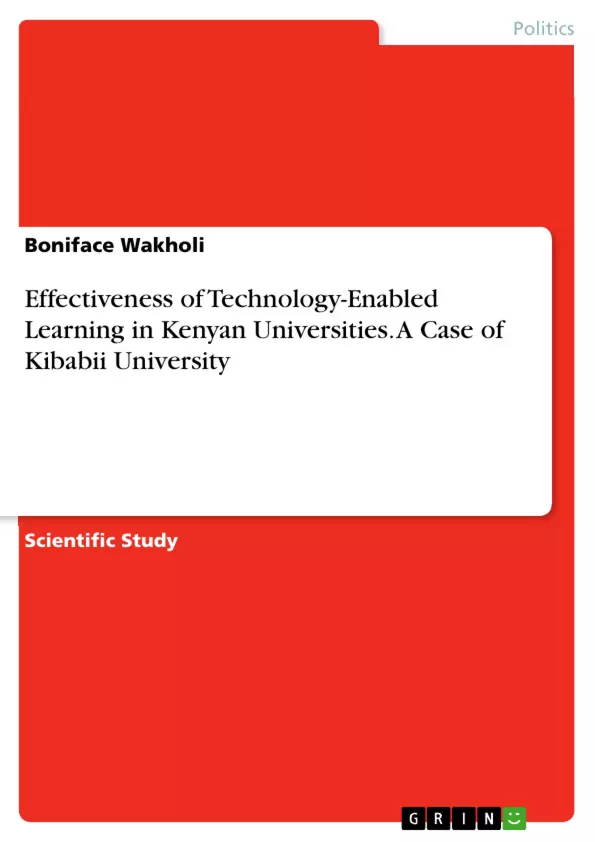The paper gives an insight on the relationship between technology and the learning in Universities. A descriptive study design was used to randomly select first year students enrolled in 2020/2021. A close-ended structured questionnaire was constructed to collect data from the students. Frequencies and percentages were used to analyse the collected data. 81,5% of students indicated that Technology-Enabled Learning is an effective mode of learning. A further 72,3% of the students pointed out that there was moderate availability of free and stable internet connectivity to make Technology-Enabled Learning solution easier.
A system of student-centered learning environments with remarkable student participation was introduced through technology-enabled learning. The students' ability to learn independently was also made possible by this, and the use of electronic resources greatly accelerated learning. It has virtually changed both teaching and learning. Before implementing technology-enhanced learning in actual classroom settings, it is essential to ascertain the ground reality through empirical research. The main objective of the study was to determine how well technology-enabled learning could enhance University education. This paper looks at merits and demerits of Technology-Enabled learning at Kibabii University. This paper investigates the effectiveness of Technology-Enabled Learning through an integrative review by answering the following questions: How effective is Technology-Enabled learning? What makes Technology-Enabled Learning solutions effective?
Inhaltsverzeichnis (Table of Contents)
- Introduction
- Literature Review
- Methodology
- Population
- Sample Size
- Data Collection Tools
- Statistical Techniques Used
- Findings
- Statistics
Zielsetzung und Themenschwerpunkte (Objectives and Key Themes)
This paper aims to evaluate the effectiveness of technology-enabled learning in enhancing university education, specifically at Kibabii University in Kenya. The study investigates the impact of technology-enabled learning on student engagement, independent learning, and overall academic performance.
- Effectiveness of Technology-Enabled Learning
- Factors influencing the effectiveness of Technology-Enabled Learning solutions
- The relationship between technology and learning in universities
- The impact of technology-enabled learning on student engagement and independent learning
- The role of internet accessibility and technology infrastructure in supporting technology-enabled learning
Zusammenfassung der Kapitel (Chapter Summaries)
The introduction provides an overview of the growing importance of technology-enabled learning in higher education, highlighting the shift towards student-centered learning environments and the need for empirical research to understand its effectiveness.
The literature review explores various theoretical frameworks and research findings related to the impact of technology on learning. It discusses the benefits and challenges of technology-enabled learning, including the importance of self-efficacy, digital literacy, and learner perceptions. It also examines the adoption of technology-enabled learning in different contexts and the factors that influence its effectiveness.
The methodology section details the research design, population, sample size, data collection methods, and statistical techniques employed in the study.
Schlüsselwörter (Keywords)
The main keywords and focus topics of this study include: Technology-Enabled Learning, eLearning, Blended Learning, Effectiveness, University Education, Student Engagement, Independent Learning, Internet Accessibility, Technology Infrastructure, and Academic Performance.
Frequently Asked Questions
How effective is Technology-Enabled Learning in Kenyan universities?
Research at Kibabii University shows that 81.5% of students consider Technology-Enabled Learning to be an effective mode of education.
What are the benefits of student-centered learning environments?
They promote remarkable student participation, enable independent learning, and accelerate the learning process through electronic resources.
How does internet connectivity affect e-learning?
Stable internet is crucial; 72.3% of students noted that moderate availability of free internet makes technology-enabled solutions easier to implement.
What are the main challenges of Technology-Enabled Learning?
Challenges include infrastructure limitations, the need for stable internet, and ensuring both students and staff have adequate digital literacy.
What was the methodology of the Kibabii University study?
The study used a descriptive design, randomly selecting first-year students and collecting data through structured questionnaires analyzed by frequencies and percentages.
- Quote paper
- Boniface Wakholi (Author), 2023, Effectiveness of Technology-Enabled Learning in Kenyan Universities. A Case of Kibabii University, Munich, GRIN Verlag, https://www.hausarbeiten.de/document/1388926


